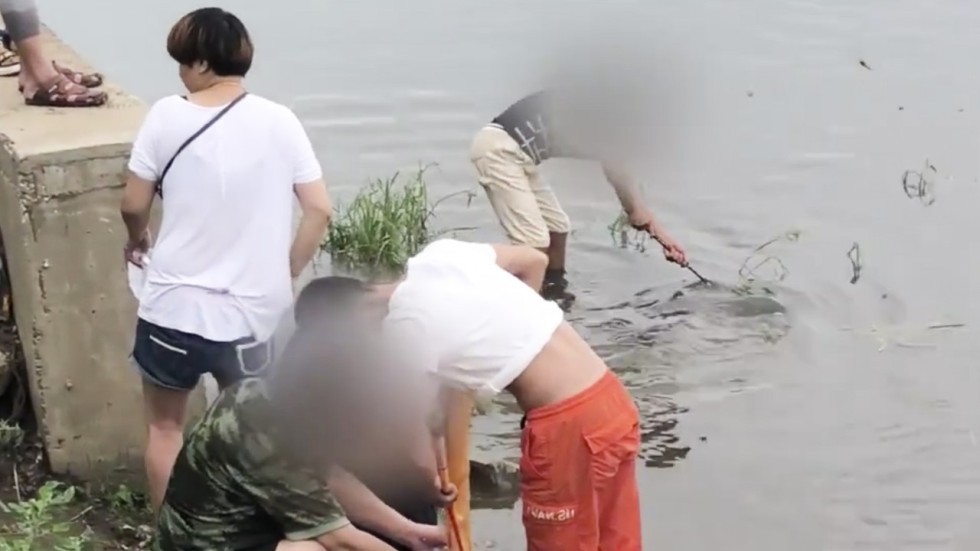A Buddhist Tradition to Save Animals Has Taken an Ugly Turn
What began as a quest to protect wildlife is now killing animals and harming ecosystems.

A Buddhist monk in Beijing, China, prepares to release turtles into the sea. Conservationists say that too often "mercy releases" end up harming animals. PHOTOGRAPH BY EYEPRESS, AP
By Jani Actman
PUBLISHED JANUARY 23, 2017
Claudia He Yun recently witnessed an incident outside a Buddhist temple in the Tiantai Mountains, in eastern China, that disturbed her: a group of people about to place a laptop-size turtle in a shallow moat surrounding the property. A monk stood with them reciting something, possibly a blessing for the turtle.
“It was probably a sea turtle and it will probably die,” says He Yun, who leads the China program for the Alliance of Religion and Conservation, an organization that works to engage religious communities in environmental issues. “Presumably this thing happens all the time—we were just there for a few hours.”
The group had gathered to carry out a “mercy release,” an ancient ritual in which Buddhists free captive animals to generate positive karma through an act of kindness. In China, home to an estimated 245 million Buddhists, the practice dates back more than a thousand years. As the story goes, a Buddhist leader—concerned that fishermen in the Tiantai region were creating bad karma by taking the lives of fish—encouraged them to release the creatures in man-made ponds.
But according to He Yun and other experts, a tradition that once encouraged the spontaneous release of doomed animals has today become a commercial enterprise in which people buy animals specifically to release them. The process may injure—or even kill—them.
This has “created a thriving industry for those who trap, trade, and sell wild animals for release, taking advantage of Buddhists’ empathy for animals,” said the Venerable Refa Shi, president of The American Buddhist Confederation of New York, in a press release issued by Humane Society International.
Buddhists from Hong Kong to France to the United States—and even non-Buddhists, especially in China—have adopted the practice, also known as fangsheng. According to Humane Society International, hundreds of millions of animals are involved each year. They range from monkeys to turtles, which symbolize longevity in Chinese culture.
“If you lied to your wife or stole money from the company, you might think that you have to release a thousand animals to get bonus points to wipe out all those debts,” says Martin Palmer, also with the Alliance of Religion and Conservation. “The bigger the crime, the bigger the need to release a more exotic animal to get more bonus points.”
FREEDOM OR DEATH?
Problems with mercy releases have escalated as rising wealth in Asian countries has seen increasing numbers of Buddhists shopping around for animals to liberate. Religious institutions have begun speaking out against irresponsible releases, and laws now regulate the practice in Beijing and Taiwan, among other places. Nevertheless, just this month firefighters rushed to save pythons, turtles, and other captive animals freed on a beach in China’s Hainan Province.
“More and more people are knowingly or not knowingly engaging in mercy releases that turn out to actually be destructive to wildlife,” He Yun says.
One concern is that animals are trapped and sold illegally, as in Beijing’s Badachu Park, where suspected bird traffickers market their wares to people looking for fangsheng credit. (Related: “Tiger Temple Accused of Supplying Black Market”)
Another is that “the animals are often trapped, kept in appalling conditions, released, and often trapped again,” Palmer says. An article referenced in the journal Contemporary Buddhism described a situation in which Buddhist organizations ordered birds en masse from retailers for release, only for hunters to wait to catch the freed birds and begin the cycle all over again. Palmer says that in these schemes, some monks even take a cut of the profits.
Additionally, captured animals may die during transport or after release because they’ve been injured or set loose in unsuitable habitats. Or by releasing alien species into the environment, people unwittingly can wreak havoc on ecosystems. “Mercy releases are a growing problem,” Chris Harley, an ecologist at the University of British Columbia, in Canada, told Audubon magazine in 2014.
In May 2015 the Kadoorie Farm and Botanic Garden, an animal rescue center in Hong Kong, said in a press release that it had received two nonnative snapping turtles that had been released into a reservoir. The animals, the center said, “could cause major ecological impacts to local species.” And in October authorities stopped several people from attempting to free 500 Brazilian turtles, an invasive species, on campus at Peking University, in Beijing.
AN ECO-FRIENDLY APPROACH
He Yun’s organization is working with religious leaders in China to raise awareness about mercy releases and develop alternatives to the way the ritual is practiced. One strategy is to entice Buddhists to earn their karma points by going vegetarian or donating to groups that help combat the illegal wildlife trade. “It requires a cultural shift,” Palmer says, so that people can still get good karma but by truly helping animals. (Also see: “These People Are Using the Word of God to Save Animals”)
Buddhists from Grace Gratitude Buddhist Temple, in Manhattan’s Chinatown, recently got creative by donating to and working with wildlife rehabilitators. Several years ago they joined representatives from New York City’s Wild Bird Fund to release birds in Central Park. They even gave the activity a new name: “compassionate release.”
This story was produced by National Geographic’s Special Investigations Unit, which focuses on wildlife crime. Read more stories on Wildlife Watch. Send tips, feedback, and story ideas to
ngwildlife@ngs.org.
Jani Actman reports on wildlife crime and exploitation for Wildlife Watch, a part of National Geographic's Special Investigations Unit.









 Reply With Quote
Reply With Quote








